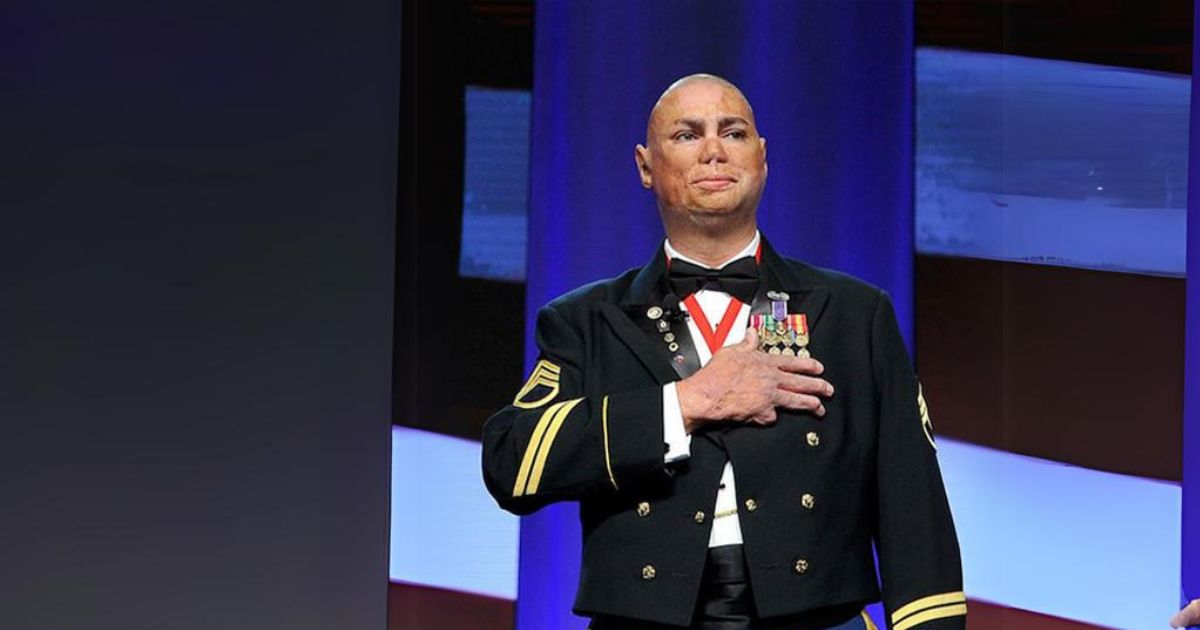
How can you lead better in your community? What makes a good leader? And what lessons from Veterans can we apply in our day-to-day lives?
Shilo Harris didn’t take a straight path to becoming a decorated combat Veteran, author, and motivational speaker. In fact, his journey was filled with setbacks, and challenges, that had taught him to lead better in his life.
Growing up with a Vietnam Veteran father and a World War II Veteran grandfather, Harris was destined for the military. “My whole life’s mission was to be a soldier,” he says. Yet, his teenage years weren’t without their troubles. A DUI almost derailed his dreams, but 9/11 reignited his passion for service.
After that life-changing moment, he pursued his dream of becoming a leader and serving his country, so he joined the Army and was stationed in Germany.
He quickly rose through the ranks and became a team leader and truck commander. On February 19, 2007, his vehicle was hit by an IED, killing three of his soldiers. He was severely injured and spent 48 days in a coma. He experienced an alternate reality during the coma, which he described as being close to hell.
Emerging from the coma, Harris began a long and arduous journey of recovery. With the support of his family, friends, and fellow Veterans, he rebuilt his life, finding a new purpose in sharing his story and advocating for Veterans’ needs.
After this life-changing accident, Harris’ bond with the Veteran community only grew stronger, as the need to help others in this community.
For him, this was a reminder that even in the face of unimaginable loss, we can find strength in service, connection, and a commitment to helping others. His military experiences make him understand the power of people working together towards one common goal.
A strong support system is essential for anyone, but it is especially important for Veterans, it can save lives like it did Harris.
Veterans often face unique challenges, such as post-traumatic stress disorder (PTSD), depression, and anxiety. Having a support system can help Veterans cope with these challenges and transition successfully to civilian life.
There are many different types of support systems available to Veterans. Some Veterans find support from family and friends, while others find it from fellow Veterans, support groups, or mental health professionals.
A support system can provide Veterans with:
If you are a Veteran, there are many resources available to help you find a support system. You can contact your local Veterans Affairs office, a Veteran service organization, or a mental health professional.
Harris’ experiences in the military, particularly the trauma he endured and witnessed, profoundly shaped his leadership philosophy. He emphasizes the importance of empathy, compassion, and genuine connection with others.
“As a leader, you have to learn how to read your soldiers without actually hearing their words,” he says. “Their body language, their behavior, a lot of these things are factors.”
Harris also stresses the value of recognizing and addressing one’s own struggles in order to better lead and support others. His willingness to open up about his own experiences with PTSD and the challenges he faced in recovery has resonated with countless Veterans and inspired them to seek help.
The Veteran community played an instrumental role in Harris’ recovery and his transition to civilian life. Harris credits Veteran support networks and the shared understanding that only those who have served can provide for helping him find a new purpose and meaning in life. He encourages Veterans to reach out to one another, offer support, and build a strong sense of community.
Harris’s journey hasn’t been without its challenges for his family. He openly shares the toll his experiences have taken on his children, mirroring the struggles he faced growing up with a father suffering from PTSD.
He emphasizes the need for open communication, understanding, and support within families of Veterans. He also highlights the importance of Veteran support networks and resources, not just for Veterans themselves, but for their loved ones as well.
Today, Harris continues to serve his fellow Veterans as a motivational speaker, author, and advocate. He speaks openly about PTSD, Veteran suicide, and the unique challenges faced by military families. His book, Steel Will, chronicles his journey and serves as a source of inspiration for others.
Harris’ unwavering commitment to serving others and making a positive impact on the Veteran community is a testament to his resilience and the enduring power of the human spirit.
Shilo Harris’ story is one of courage, resilience, and the transformative power of service. It’s a reminder that even in the darkest of times, there is hope, healing, and a community ready to embrace those who have served.
We encourage you to listen to the full podcast episode to gain a deeper understanding of Harris’ journey and the lessons he has learned along the way.
If you or someone you know is a Veteran, please reach out, offer support, and learn more about the resources available to the Veteran community. Together, we can honor the service of our Veterans and help them thrive in civilian life.
Remember, you’re not alone in this journey. The Veteran Led community is here to support you every step of the way.
Don’t hesitate to share your own experiences or reach out if you need guidance. Together, we can empower Veterans to thrive in their post-military lives.
Tune in to the Veteran Led Podcast to learn more powerful and inspiring stories for Veterans and how they keep improving and contributing to our community.
Connect with Shilo on Facebook – Instagram – YouTube – LinkedIn and check out his website at shiloharris.com. You can also get a copy of Shilo’s book Steel Will.
Our monthly newsletter features about important and up-to-date veterans' law news, keeping you informed about the changes that matter.